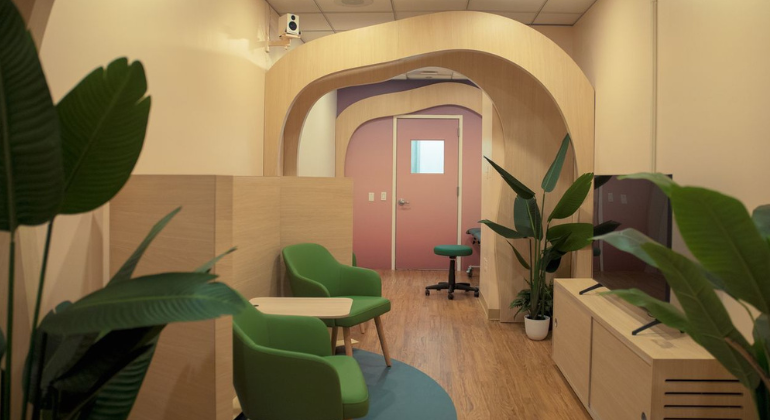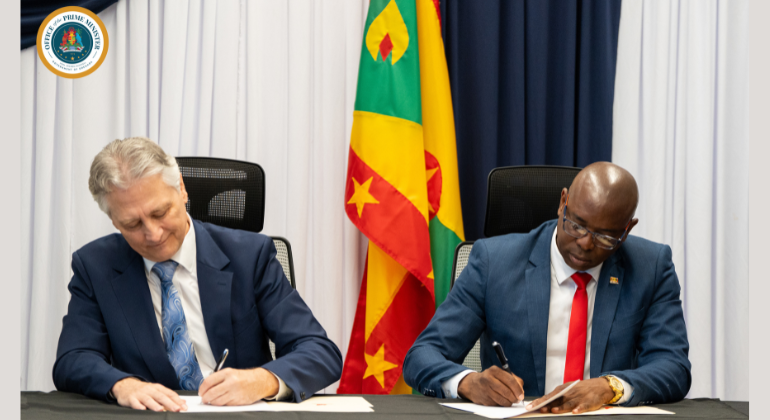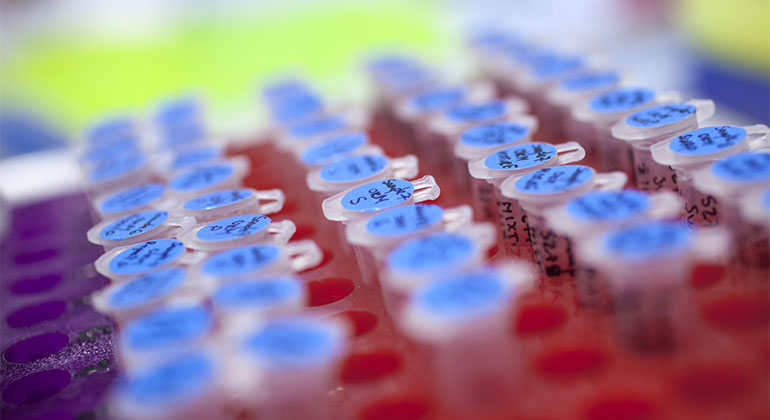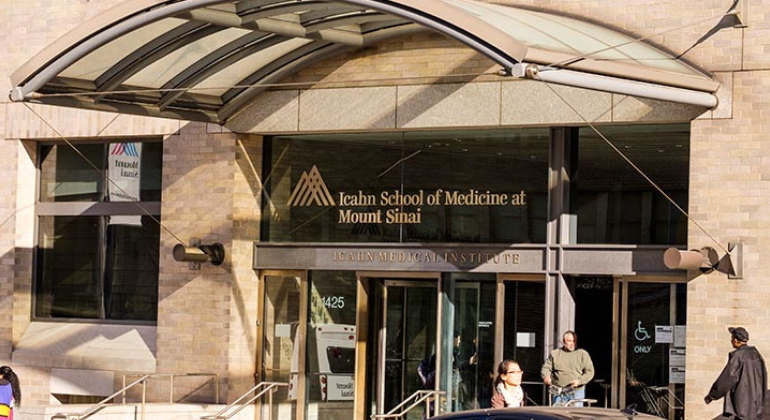Mount Sinai Prostate Cancer Surgeon Performs 4000th Robotic-Assisted Radical Prostatectomy
David Samadi, MD, Vice Chairman of Urology, achieved the milestone this spring.
This spring, David B. Samadi, MD, Vice Chairman, Department of Urology and Chief of Robotics and Minimally Invasive Surgery at The Mount Sinai Medical Center, has achieved the milestone of performing his 4000th robotic-assisted laparoscopic prostatectomy. As one of the world's most experienced prostate cancer surgeons, he has revolutionized the field with the Samadi Modified Advanced Robotic Technique (SMART) for robotic surgery, which results in fewer side effects and a better quality of life for prostate cancer patients. About half of these 4000 procedures were performed using the SMART technique.
"There is a demand for minimally invasive procedures that result in smaller scars, quicker healing and minimal risk of becoming impotent or incontinent," said Dr. Samadi. "The combination of the robotic technology and SMART technique allows me to be even more precise when eliminating prostate cancer. It underscores the importance of volume and experience in this type of surgery. Even difficult operations become routine with the robot and the SMART technique."
Trained in urologic oncology, and both open and laparoscopic surgery, Dr. Samadi uses the da Vinci® S HD-Surgical System Robot as a tool that gives him ease of movement, increased magnification and visualization as well as extraordinary dexterity, precision and range of movement. With the robot, Dr. Samadi creates only six very small instrument holes so pain, bleeding and scarring are significantly minimized. With the SMART technique, the prostate is removed without opening or suturing the dorsal vein complex (DVC). As a result, the risk of damage to the nerves, tissue, and sphincter is greatly reduced. The actual procedure can be performed in two hours or less.
"The SMART technique is an advanced technique that should not be performed early in a robotic surgeon's learning curve," advised Dr. Samadi. "What's important to note is that since there is no suture in the DVC, it results in a longer length of urethra, which results in better continence and less chance of nerve damage," explains Dr. Samadi.
"Since there is minimal dissection performed on the sides of the prostate, there is less chance of damaging the nerves responsible for sexual function, which means a better sex life because the sexual function is ultimately improved."
Outcome studies demonstrate that SMART surgery is more effective than other treatments such as radiation therapy (including radioactive seed implant [brachytherapy]) and external beam radiation therapy (EBRT). Dr. Samadi points out that the surgical option, whether robotic, open or laparoscopic, is not possible if the cancer returns after treatments with radiation.
With a convenient midtown location in New York City, the Samadi Robotic Institute is dedicated to providing comprehensive, state-of-the-art personalized and compassionate care for men with prostate cancer. Eligible patients also have the opportunity to participate in the latest clinical trials for prostate cancer.
"Our goal is to help each patient make an informed decision about their treatment options for prostate cancer and choose the treatment that is the best fit for them personally and medically," said Dr. Samadi. "Our center’s unique multi-disciplinary, collaborative and evidence-based approach will empower patients with information they need to make the best treatment decisions, thereby helping to ensure satisfaction with treatment outcomes."
In addition to diagnosing and treating prostate cancer, Dr. Samadi also specializes in treating bladder cancer, kidney cancer and other urological diseases. He completed his post-graduate training in general surgery at Montefiore Medical Center and in urology at Albert Einstein School of Medicine and Montefiore Medical Center. He did an oncology fellowship in urology at Memorial Sloan Kettering Cancer Center and a robotic radical prostatectomy fellowship at Henri Mondor Hospital Creteil in France under the mentorship of Professor Claude Abbou. Dr. Samadi is a member of the American Urological Association, the American Medical Association and the Fox News Medical A-Team.
Dr. Samadi’s office is located at 625 Madison Avenue in New York City and surgery is performed at The Mount Sinai Hospital at 101st Street and Madison Avenue. To learn more please visit: www.roboticoncology.com and www.smart-surgery.com.
About The Mount Sinai Medical Center
The Mount Sinai Medical Center encompasses both The Mount Sinai Hospital and Mount Sinai School of Medicine. Established in 1968, Mount Sinai School of Medicine is one of the leading medical schools in the United States. The Medical School is noted for innovation in education, biomedical research, clinical care delivery, and local and global community service. It has more than 3,400 faculty in 32 departments and 14 research institutes, and ranks among the top 20 medical schools both in National Institutes of Health (NIH) funding and by US News and World Report.
The Mount Sinai Hospital, founded in 1852, is a 1,171-bed tertiary- and quaternary-care teaching facility and one of the nation's oldest, largest and most-respected voluntary hospitals. In 2011, US News and World Report ranked The Mount Sinai Hospital 16th on its elite Honor Roll of the nation's top hospitals based on reputation, safety, and other patient-care factors. Of the top 20 hospitals in the United States, Mount Sinai is one of 12 integrated academic medical centers whose medical school ranks among the top 20 in NIH funding and US News and World Report and whose hospital is on the US News and World Report Honor Roll. Nearly 60,000 people were treated at Mount Sinai as inpatients last year, and approximately 560,000 outpatient visits took place.
For more information, visit http://www.mountsinai.org/.
Find Mount Sinai on:
Facebook: http://www.facebook.com/mountsinainyc
Twitter: @mountsinainyc
YouTube: http://www.youtube.com/mountsinainy
# # #
About the Mount Sinai Health System
Mount Sinai Health System is one of the largest academic medical systems in the New York metro area, with 48,000 employees working across seven hospitals, more than 400 outpatient practices, more than 600 research and clinical labs, a school of nursing, and a leading school of medicine and graduate education. Mount Sinai advances health for all people, everywhere, by taking on the most complex health care challenges of our time—discovering and applying new scientific learning and knowledge; developing safer, more effective treatments; educating the next generation of medical leaders and innovators; and supporting local communities by delivering high-quality care to all who need it.
Through the integration of its hospitals, labs, and schools, Mount Sinai offers comprehensive health care solutions from birth through geriatrics, leveraging innovative approaches such as artificial intelligence and informatics while keeping patients’ medical and emotional needs at the center of all treatment. The Health System includes approximately 9,000 primary and specialty care physicians and 10 free-standing joint-venture centers throughout the five boroughs of New York City, Westchester, Long Island, and Florida. Hospitals within the System are consistently ranked by Newsweek’s® “The World’s Best Smart Hospitals, Best in State Hospitals, World Best Hospitals and Best Specialty Hospitals” and by U.S. News & World Report's® “Best Hospitals” and “Best Children’s Hospitals.” The Mount Sinai Hospital is on the U.S. News & World Report® “Best Hospitals” Honor Roll for 2025-2026.
For more information, visit https://www.mountsinai.org or find Mount Sinai on Facebook, Instagram, LinkedIn, X, and YouTube.
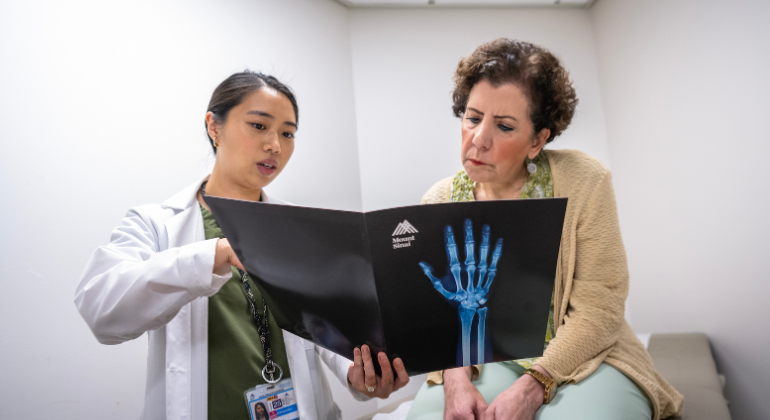
Mount Sinai Implements Own the Bone® Program for Fragility Fracture Patients
Jul 08, 2025 View All Press Releases
Mount Sinai Establishes Steven S. Elbaum Family Center for Caregiving
May 20, 2025 View All Press Releases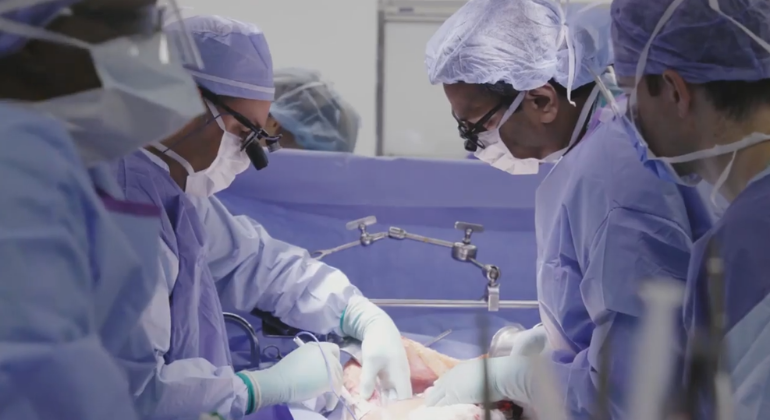
Mount Sinai Surgeons Perform First Heart-Liver-Kidney Transplants in New York State
May 20, 2025 View All Press Releases

